When you buy through our links, we may earn a commission. Products or services may be offered by an affiliated entity. Learn more.
Best Sleep Trackers of 2026
Numbers don’t lie. You’ve probably heard this applied to business or sports, but it’s becoming increasingly relevant to sleep, thanks to the technology found in sleep trackers.
With a sleep tracker, you can get a clear look at the quantity and quality of your sleep on a nightly basis, and it can also help identify sleep problems. Many include built-in coaching to improve your sleep habits and can also track progress to see how well different strategies work over time.
Sleep trackers vary based on a number of different factors, from the technology they use to the sensors that monitor your sleep. Our testing team took dozens of them for a spin to see which ones offered the usability and features worthy of a spot on our list of the best trackers of 2026.
Our Top Pick: Oura Ring 4
Through all our hands-on testing, we found the Oura Ring 4 to be the best sleep tracker of 2026. We were huge fans of its variety of health and sleep tracking metrics, plus it’s easy to find your size and wear.
How We Tested the Best Sleep Trackers
Testing Criteria for Sleep Trackers
When it came to finding the best sleep trackers to test, we chose a few key factors to focus on:
- Helpful, easy-to-understand metrics: Each sleep tracker had to offer health data that was digestible and useful for users. Some of the most common sleep metrics measured include sleep stage (light, deep, REM), total time spent asleep, and your sleep score, which is a data point calculated using different algorithms depending on the tracker or app you’re using. Most of the sleep trackers we tested also provided insight into fitness and brain activity measurements, such as heart rate, blood oxygen level, and daily steps.
- Ease of use: Sleep trackers come with a natural learning curve as you navigate a new piece of tech, but we wanted to ensure neither the tracker or the app were too difficult to figure out. The data itself should be easy to access, too. Anyone should feel comfortable working the sleep trackers on our list.
- Comfort: Lastly, we wanted to make sure every sleep tracker on our list felt comfortable to sleep with. Comfort can be pretty subjective, but that’s why we tested out easy-to-wear devices (think the Oura Ring 4). When it came to more involved setups like the Bía Smart Sleep Mask, we prioritized construction, looking out for breathable materials and adjustable headbands.
How We Evaluated
To start, we polled our office to see if anyone had any preferences or previous experience with sleep trackers. From there, we researched other popular sleep trackers, coming up with a list of wearables to test. We prioritized having a variety of options (rings, watchbands, and headbands), and chose to base our top picks around digestible health measurements, comfortable wear, and ease of use.
We tried each of these sleep trackers for around 30 days to ensure the device had enough time to get acclimated to our sleep habits and, in some cases, offer personalized health suggestions.
During the trial period, our testers didn’t change anything about their day-to-day routine to ensure trackers were capturing accurate data. After testing, we ranked each of the sleep trackers to come up with a total score out of 10 and assigned accolades depending on our hands-on experience.
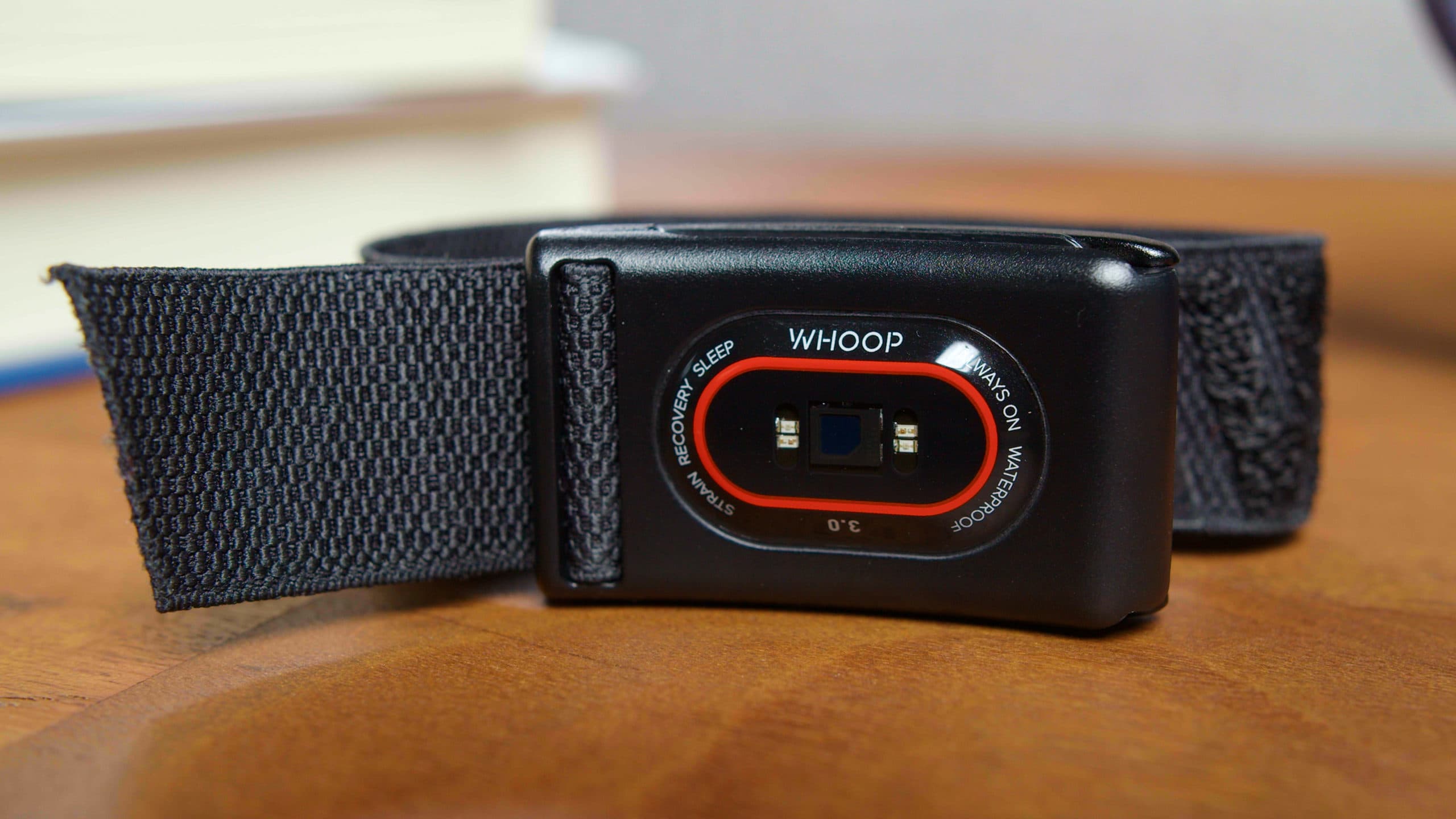
Best Overall
9.1/10Test Lab Score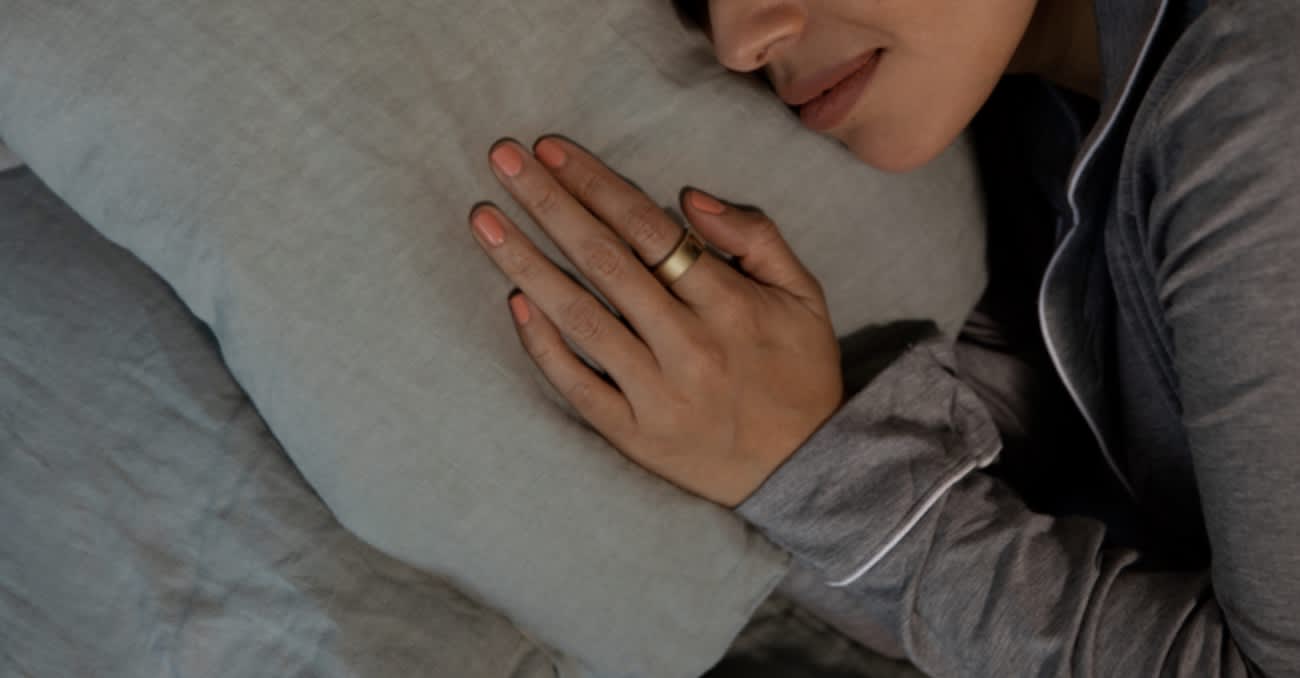
Oura Ring 4
Key Details
- What It Is: The Oura Ring 4 is a sleek sleep tracker that fits comfortably on your finger. It measures a variety of sleep, wellness, and activity metrics to provide an all-around personalized health experience.
- Who It’s Best For: Users who want sleep, health, and activity metrics matched with a non-invasive wearable.
- Highlights: It’s easy to use and wear, provides a wide variety of health measurements, and the battery life is lengthy.
- Drawbacks: You need a membership to access all of your data via the accompanying Oura app. It can also take some time for the ring to calibrate to your health and sleep habits.
Full Breakdown
How do you wear the Oura Ring 4?
The Oura Ring 4 functions like any other ring you’d wear on a daily basis. When we tried it out, our tester said that he barely noticed it, with the exception of when he wore it during workouts.
“The device is technically designed for either the index or middle finger, but the goal should be a comfortably snug fit,” he said. “After placing an order, you’ll receive a free kit with sample rings in several sizes. I personally found that the most comfortable size fit snugly on my ring finger, so that’s the size I chose. This turned out to be perfectly fine.”
What does the Oura Ring 4 measure?
Oura Ring 4 Ceramic is equipped with sensors that measure your heart rate, temperature trends, and blood oxygen levels throughout the day and night. It translates this data into three scores — Sleep Score, Activity Score, and Readiness Score — to illuminate trends in your sleep and how sleep affects your daily life. Oura Ring 4 Ceramic also serves as a fitness tracker and a trusted guide that provides tips to optimize your health.
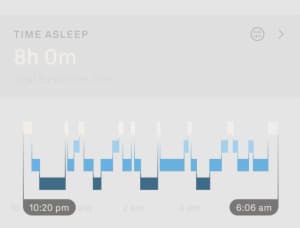
Other metrics include:
- Sleep stages (deep sleep, REM sleep, light sleep) and how much time was spent in each stage
- Nighttime movement
- Illness detection via shifts in your temperature and heart rate
- Women’s health insights, including cycle predictions and fertility tracking
- Cardiovascular capacity and 24/7 heart rate tracking
How do you see your metrics?
To see your metrics, you’ll have to download Oura’s accompanying app on a smart phone or device with iOS 15.0+ or Android 10+ (with Google Play). The app is relatively easy to navigate, especially if you’re only using it to check in with your sleep metrics. The Oura Ring syncs your data to the app overnight so you can log in the next morning to receive your insights.

Why we like the Oura Ring 4
The Oura Ring 4 Ceramic has a sleek, stylish look that complements its in-depth tracking of sleep and daily activity. One charge gets you up to eight days of battery life, and the ceramic build is lightweight and gentle on your skin.
In our Oura Ring review, we noted that we found it to be a generally impressive device thanks to its sleep and activity tracking. It provides a wealth of data without being too distracting to wear.
What we don’t like about the Oura Ring 4
To get access to your metrics, you have to download the app and sign up for a subscription, which costs $5.99/month or $69.99/year.
Best for Active People
8.8/10Test Lab Score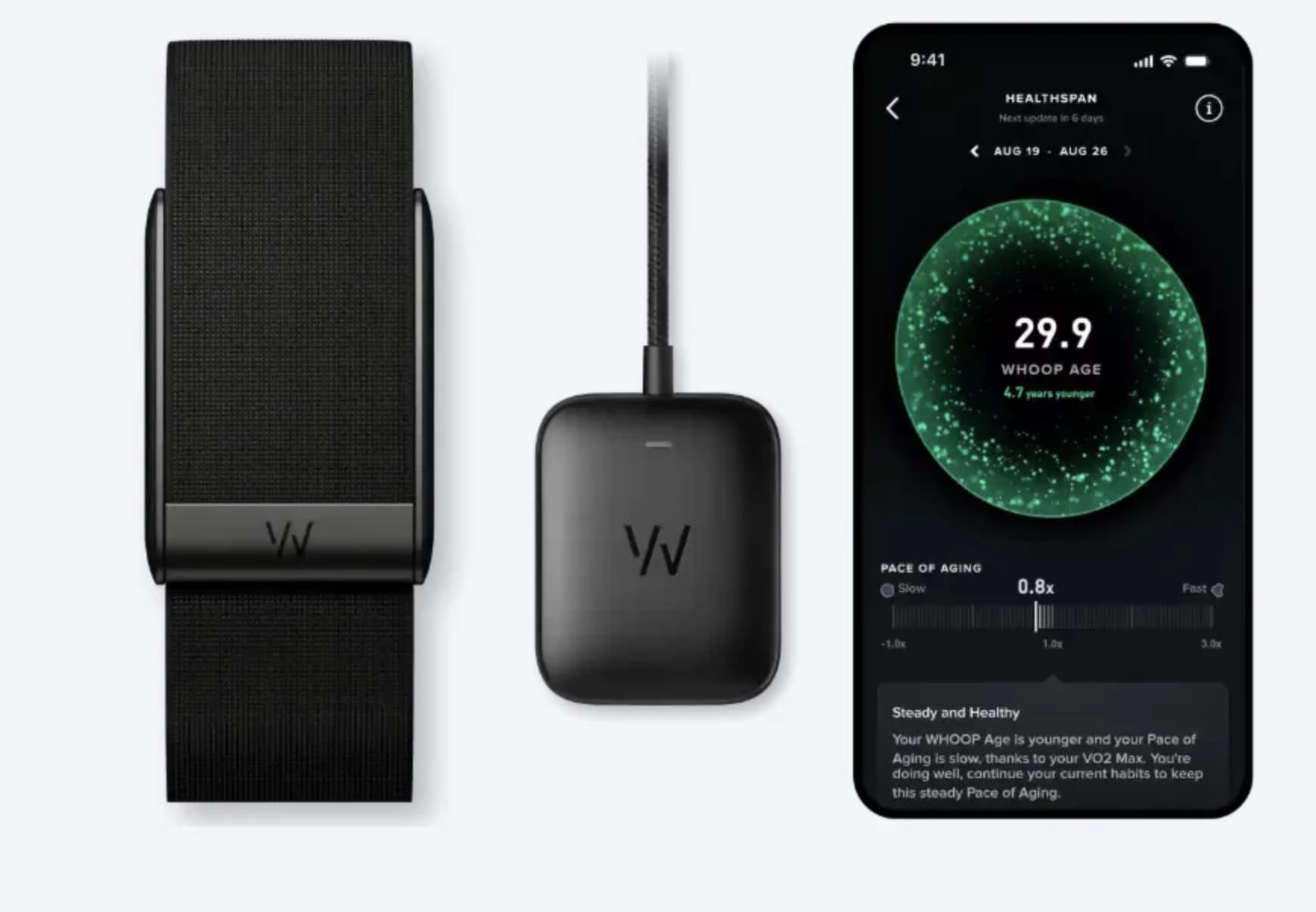
WHOOP 5.0
Key Details
- What It Is: A sleep-tracking wristband equipped with “Any-Wear” technology for added versatility. After 30 days of consistent wear, the WHOOP will be fully calibrated with your daily habits and ready to offer you healthy habits and suggestions.
- Who It’s Best For: People who want to track their sleep and activity and receive personalized health suggestions.
- Highlights: Besides in-depth metrics, you receive daily Sleep, Recovery, and Strain scores. It’s easy to wear, lightweight, and boasts a near-two week battery life on a full charge.
- Drawbacks: The membership options are pricey, and there isn’t a screen on the WHOOP so you’ll have to use the accompanying app to view all of your data.
Full Breakdown
How do you wear the WHOOP 5.0?
The WHOOP 5.0 builds on its predecessor with a lighter, more compact design and more enhanced tracking capabilities. While the WHOOP tracker is designed with a wearable wristband, the sensor can be detached from the band and used with different garments such as sports bras, compression tops, leggings, athletic boxers, and intimates.
What does the WHOOP 5.0 measure?
The WHOOP 5.0 gathers data about your sleep and also works as a high-level fitness tracker. It considers four key categories (your daily steps, sleep consistency, time spent in different heart rate zones, and your VO2 max, which is how much oxygen your body uses while exercising) to calculate your WHOOP age.
The WHOOP 5.0 is designed to spend some time calibrating to your body, so it takes around 30 days for it to get accustomed to your metrics. Within two weeks, you should expect for it to have a baseline for your sleep consistency, heart health, calorie tracking, and detailed sleep analysis. After the 30 days are up, the WHOOP 5.0 can provide personalized recovery guidance.
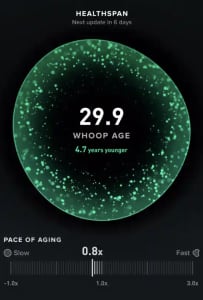
How do you see your metrics?
To see your health metrics, you’ll have to download the WHOOP app on a smart phone or device. The app will tell you your daily Sleep, Recovery, and Strain scores, and you’ll also answer questions geared towards getting WHOOP to know you better for more personalized guidance.
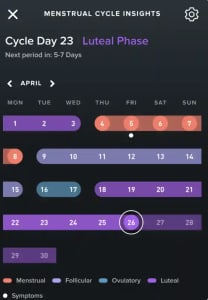
Why we like the WHOOP 5.0
When we reviewed one of the earlier versions of the WHOOP tracker, we were impressed by its many tracking features, nondescript design, and lengthy battery life. It prioritizes muscle and exercise recovery, which is something you don’t always see with health apps and trackers. The WHOOP itself is also very lightweight and there are brands available in a variety of styles and colors.
What we don’t like about the WHOOP 5.0
Similar to the Oura Ring 4.0, the WHOOP 5.0 doesn’t have a screen, so all available health tracking information is accessible only on the accompanying app. You’ll also have to sign up for a WHOOP membership if you want full access — you can choose from three plans (WHOOP One, WHOOP Peak, WHOOP Life), which range in price from $149/year to $359/year.
Best Oxygen Level Tracker
8.9/10Test Lab Score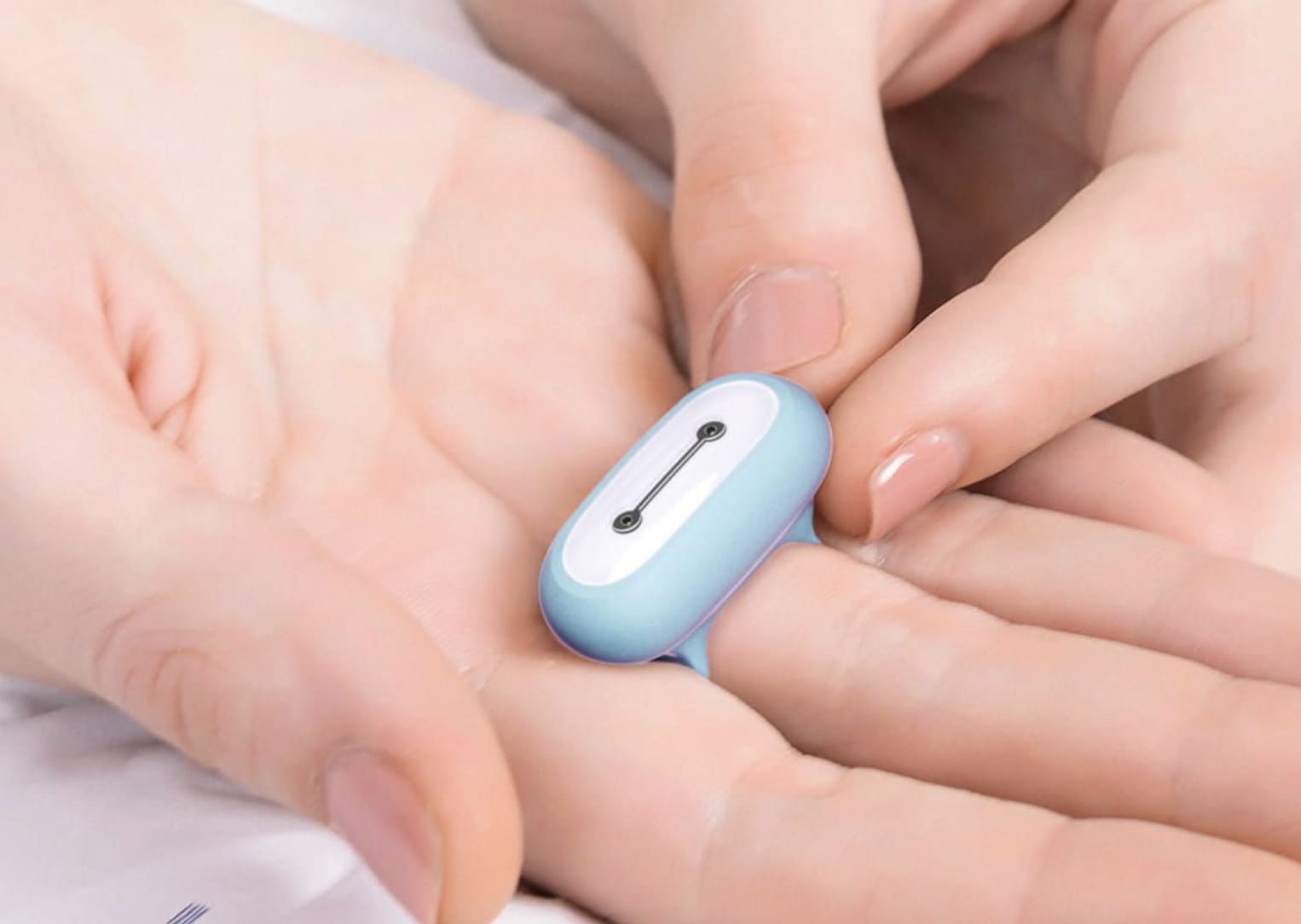
Sleepon Go2Sleep 3 Tracker
Key Details
- What It Is: A lightweight silicone ring engineered to track key metrics while you sleep, like blood oxygen levels and heart rate.
- Who It’s Best For: Users interested in real-time health and sleep tracking metrics.
- Highlights: It measures dips in blood oxygen levels, which may detect underlying sleep-related disorders. You can also view your reports online or on the app, and download them to share with your doctor.
- Drawbacks: The bulky design may be hard to adjust to, especially throughout the night.
Full Breakdown
How do you wear the Sleepon Go2Sleep 3 Tracker?
The Sleepon Go2Sleep3 Tracker is a ring with a silicon cover. It’s available in three sizes (small, medium, large), and is worn with the wider attachment on the inside of the hand. It’s waterproof and, upon ordering, comes with three food-grade silicon ring covers.
What does the Sleepon Go2Sleep 3 Tracker measure?
This sleep tracker excels at consistent blood oxygen tracking. It also monitors your heart rate at 50Hz/s, and uses an algorithm to analyze your sleep stages and overall sleep quality. It can provide alerts if your blood oxygen level drops too much.
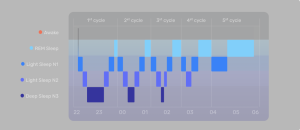
How do you see your metrics?
There’s an accompanying app that allows you to see your health metrics in real-time or the morning after a night of sleep. However, you can also view your sleep reports online via a personal health dashboard. You can also download them in PDF or Excel sheet format to share with a medical health professional.

Why we like the Sleepon Go2Sleep 3 Tracker
The SLEEPON Go2Sleep 3 Tracker is our favorite sleep tracker for monitoring your blood oxygen level continuously during sleep. It is a ring made of silicon that syncs with your phone and can identify dips in blood oxygen, which may help detect underlying sleep-related breathing disorders, like obstructive sleep apnea (OSA).
If your sleep reports show frequent wake ups or you often experience symptoms like tossing and turning, snoring, daytime fatigue, and headaches upon waking, you may want to get an at-home sleep apnea test.
What we don’t like about the Sleepon Go2Sleep 3 Tracker
The shape and the weight of the ring can take some getting use to, and the tracker also requires charging roughly every other day.
Best Multipurpose Tracking
8.6/10Test Lab Score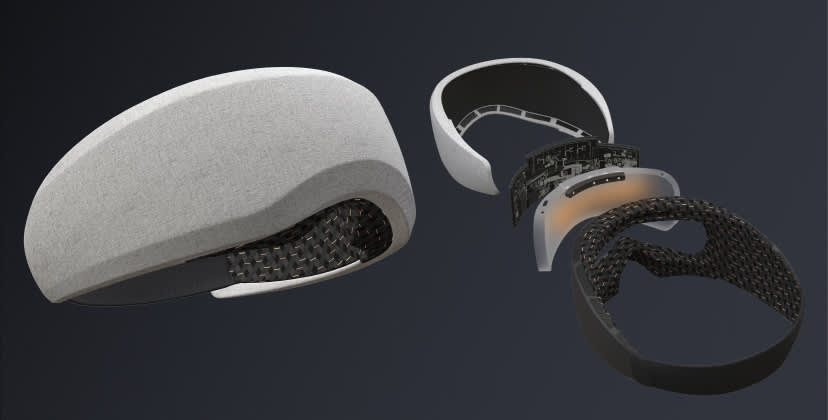
Bía Smart Sleep Mask
Key Details
- What It Is: A smart sleep mask that tracks data while shielding you from disruptive light. Choose from relaxing soundscapes and use it as a soothing sunrise alarm for breezy wakeup calls.
- Who It’s Best For: People looking for an immersive sleep tracking experience with relaxing features, like soundscapes and guided meditations.
- Highlights: It tracks sleep metrics and brain activity while also offering soothing bedtime capabilities, like a morning sunrise alarm. It’s also made to feel comfortable in all sleeping positions.
- Drawbacks: Despite its soft material, it may take some time to get used to wearing this headband at night. It’s also pretty expensive.
Full Breakdown
How do you wear the Bía Smart Sleep Mask?
The Bía Smart Sleep Mask is a headband that’s worn over the eyes, like a sleep mask. While a bit clunkier, it offers soothing bedtime features like relaxing soundscapes, a morning sunrise alarm, 100% blackout capabilities, and a soft material that was engineered to feel comfortable for all sleeping positions.
What does the Bía Smart Sleep Mask measure?
This sleep tracker measures your sleep stages and how much time you spent in them. It also has a Sleep Autopilot feature, which uses an algorithm based on functional near-infrared spectroscopy (fNIS) brain tracking to measure the connection between any sounds heard and your sleep.
You can use the accompanying Bía app for its sleep journal feature, where it’ll also ask about your daily activities (think consumption of alcohol or caffeine, naps, walks, or meditation). With consistent use, the app will begin to track your habits and suggest things to do so you can get better sleep each night.


How do you see your metrics?
Sleep metrics are all available for viewing on the Bía app. Your purchase of the mask includes your lifetime subscription, so you don’t have to worry about paying more for that, either.
Why we like the Bía Smart Sleep Mask
For a multipurpose sleep tracker, the Bia Smart Sleep Mask takes the top spot. It uses advanced technology to monitor brain activity and track your sleep stages. It also blocks out external light, offers a simulated sunrise wake-up function, and plays relaxing music tailored to help you fall asleep quickly.
What we don’t like about the Bía Smart Sleep Mask
The Bía Smart Sleep Mask is more expensive than most sleep trackers. It also isn’t a good option for people who are uncomfortable wearing something on their face at night.
Best Features
8.7/10Test Lab Score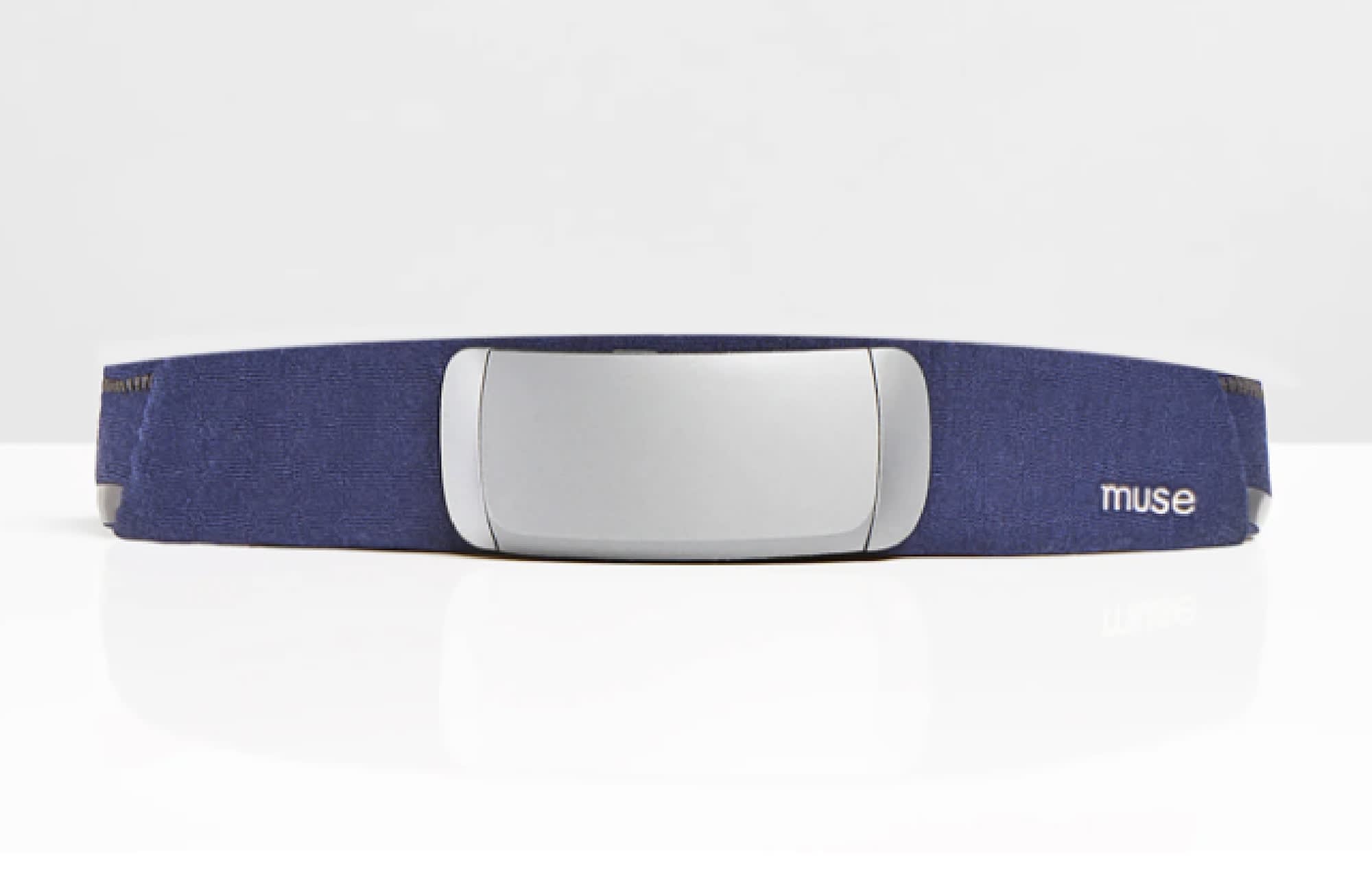
Muse S Athena + App
Key Details
- What It Is: A high-tech headband that tracks brain activity and overall sleep quality. It uses fNIRS and EEG tech to measure brain activity, heart rate, breath, and body movement in real time.
- Who It’s Best For: Users looking to learn more about the connection between their brain activity, heart rate, and general health.
- Highlights: Real-time health metrics are available on the app, along with guided meditations and soundscapes. You can view your brain activity and heart rate before and after doing these activities.
- Drawbacks: It’s expensive, and it’s more of an overall wellness tracker than a sleep tracker.
Full Breakdown
How do you wear the Muse S Athena Sleep Tracker?
The Muse S Headband is worn as a headband that stops at your temples. It’s made with a plush, breathable fabric that’s meant to offer comfort for longterm wear.
What does the Muse S Athena Sleep Tracker measure?
The Muse S Athena measures brain activity and blood flow using fNIRS and electroencephalogram (EEG) technology. This means you’ll receive metrics like:
- Brain activity
- Heart rate
- Breath
- Body movement
During the times that you wear the headband, you’ll get audio, real-time feedback based on your brain activity.

How do you see your metrics?
You can view your real-time metrics on the Muse app. Besides tracking your sleep and brain insights, you can also listen to soothing soundscapes and guided meditation sessions to prepare for a relaxing night’s rest.
Why we like the Muse S Athena Sleep Tracker
The Muse S Athena Headband Sleep Tracker and App boast an impressive list of features, including sensors that collect a diverse range of data about your sleep. The tracker is designed to pair with Muse’s app and build synergy between your sleep and a regular meditation practice.
What we don’t like about the Muse S Athena Sleep Tracker
Some sleepers may find it uncomfortable to wear a headband during the night. And in addition to the expensive up-front price, a subscription is required to get the most out of the meditation library.
Comparison Chart: Best Sleep Trackers
| Oura Ring 4 | WHOOP 5.0 | Sleepon Go2Sleep 3 Tracker | Bía Smart Sleep Mask | Muse S Athena | |
|---|---|---|---|---|---|
| Price | $499 | Starts from $239/year | $109 | Starts from $419 | $380 |
| Type of Wearable | Ring | Wristband | Ring | Sleep mask | Headband |
| Battery Life | 5 to 8 days | ~14 days | 2 to 3 nights | 10 hours | Up to 10 hours |
| Our Favorite Insights | Sleep stages, nighttime movement | Sleep consistency, sleep stages | Blood oxygen level, heart rate | Sleep stages, brain activity | Real-time brain activity and heart rate |
| Overall Rating | 9.1 | 8.8 | 8.9 | 8.6 | 8.7 |
Best Sleep Trackers Video
Watch the video below to learn more about our recommendations for the best sleep trackers.
What Is a Sleep Tracker?
A sleep tracker is a device that gathers information related to how much or how well you sleep.
Because sleep is complex, there’s no single measurement that perfectly reflects whether or not you’re getting a good night’s sleep. To address that, sleep trackers first collect raw data and then use an algorithm to interpret what the data says about your sleep.
For example, a sleep tracker might measure how much physical movement you have during the night. If it detects that you were out running a 5k at 4 a.m., it can easily calculate that your sleep was lacking.
Of course, the reality is much more nuanced. Depending on the type of tracker and its sensors, it may monitor:
- Breathing rate
- Heart rate
- Oxygen levels in your blood
- Body movements
- Noise, including from snoring
- Bedroom temperature
Sleep trackers can be a wearable device like a bracelet or ring. They can also be non-wearable sensors that sit on your bedside table or under your mattress.
Unlike mobile phones and GPS devices, a sleep tracker is engineered specifically to deliver sleep-related insights. Although other devices may collect some similar data, they lack the detail and depth of information offered by a sleep tracker.
Who Should Use a Sleep Tracker?
You should use a sleep tracker if you’re curious about how well you’re sleeping and are looking for ways to get better sleep. Most trackers come with tools to visualize and understand the data and often provide actionable steps to enhance sleep habits.
If you are having difficulty sleeping, a sleep tracker can be a source of relevant information to share with your doctor. Sleep trackers can also help if you have an irregular work schedule and want to keep an eye on the quantity and quality of your sleep.
Sleep trackers are also extremely popular among people who like to measure and optimize different aspects of their lives. For example, athletes and fitness enthusiasts frequently take advantage of insights from sleep trackers to boost their performance and overall health.
Who Shouldn’t Use a Sleep Tracker?
You shouldn’t use a sleep tracker if you’re someone who gets anxious or obsessive about daily health measurements. Worrying too much about “hitting your sleep numbers” can generate stress, which is known to harm sleep.
You also shouldn’t use a sleep tracker as a way to avoid seeing a doctor about serious sleep problems, such as insomnia or constantly dozing off during the day. If you have sleep concerns, a sleep tracker may help, but it should be used in conjunction with advice from a trained health professional.
Are Sleep Trackers Accurate?
Sleep trackers can provide meaningful data, but they aren’t perfectly accurate. Technology in sleep trackers has come a long way, but even sleep experts can’t say exactly how well they measure sleep.
To assess accuracy, a tracker should be compared head-to-head with a home sleep test or a formal sleep study, which takes place overnight in a specialized lab. This type of comparison is not always practical, though, especially since sleep trackers are constantly being updated with new features and technology.
Just remember that your sleep tracker’s findings are not the end-all, be-all. Instead, use the tracker to identify patterns in your sleep and potential areas for improvement while also accounting for things that the tracker doesn’t monitor, like how well-rested you feel when you wake up and how energetic you are throughout the day.
How to Choose a Sleep Tracker
If you want to learn more about your sleep, you have plenty of sleep trackers to choose from. Knowing about the types of trackers and the different features and benefits can help you find a model that will be easy for you to use and give you the information you’re looking for.
Type of Tracker
While we use the term sleep tracker broadly, there are many different types of devices available.
- Wearables for your hand or wrist: This popular category includes rings, wristbands, and advanced smartwatches. They tend to be lightweight, and many can collect health data throughout the day instead of just during sleep.
- Wearables for your head: Headbands and eye masks are the most common sleep trackers that you wear on your head. They are typically meant just for use during sleep. Many have the potential to measure brain activity, which can be a valuable source of data about sleep.
- Under-mattress sensors: These non-wearable trackers go underneath your mattress and collect data over the course of the night. They are an effective and affordable option if you find it bothersome to wear a tracker.
- Smart mattresses: Some technologically advanced mattresses have sensors in the cover that can track sleep. This type of tracker may be a compelling choice if you are also in the market for a new mattress and don’t need daytime activity tracking.
- Smartphone apps: Apps are generally less robust than other sleep trackers because the range of data they collect is limited. However, some apps can provide meaningful data or integrate information from other sources, including wearables.
When deciding which type of tracker is right for you, think about the type of data you want, including whether you want information about your daytime activity or fitness. Also consider whether you’ll be comfortable wearing a device on your head, hand, or wrist while you sleep.
Sleep Data Collected
Make sure to look for a sleep tracker that has sensors to collect the data that’s most important to you. For instance, if you’re concerned about your breathing at night, you’ll want a tracker that measures respiration. Before making a purchase, look closely at exactly what a tracker monitors.
Sleep Analytics and Coaching
Every sleep tracker collects data, but there can be a lot of variation in how that data is analyzed and presented to you.
With some sleep trackers, you’ll get an overall sleep score or charts that help visualize your sleep quantity or quality. Keep in mind, though, that the data analysis is based on the company’s own algorithm, which will have some margin for error. Even the most advanced sleep trackers may not accurately identify sleep stages.
Think about the kind of analytics that would be most meaningful for you, and also consider whether you want a tracker that proactively offers you sleep tips. Make sure that whatever model you buy offers the type of information you need.
Comfort
If you’re like most sleepers, comfort is paramount. You’ll need the tracker to monitor your sleep over many hours, so don’t pick a device that will be a nuisance for you to use or wear.
Battery Life
Most wearable trackers need to be recharged at least once every few days. More frequent charging is usually needed if you want to track daytime activity or workouts.
In contrast, non-wearables can often be plugged in while you sleep, eliminating the need to charge them.
Not sure how much battery life matters to you? Think about your mobile phone and how sensitive you are to whether it’s charged. If it drives you crazy to see the battery drain quickly, look for a sleep tracker with extended battery life.
Display & Apps
For sleep tracking to benefit you, you need to be able to easily understand the information presented to you. Most sleep trackers use a website or app to share sleep analytics, so look for one that has an interface that appeals to you.
Most companies that sell sleep trackers will have screenshots of their user interface on their website. You can look in the Apple or Android App Store for reviews and screenshots of the companion apps of different sleep trackers.
Other Features and Functions
You can narrow down your sleep tracker options if you know that you want one or more specific features, such as:
- Smart alarms or a built-in sunrise alarm clock
- Fitness tracking
- GPS functionality
- Health coaching and motivation
Price
Sleep trackers often cost between $100 and $400, but comparing prices can be challenging because many sleep trackers require you to have a monthly subscription. When thinking about your budget, make sure to take into account whether it’s a one-time or recurring cost.
How to Shop for a Sleep Tracker
Once you’ve narrowed down your options and are choosing among a few sleep trackers, a few factors may help guide your decision:
- Tech compatibility: It can be easy to overlook when thinking about other features, but you want to ensure that the sleep tracker and any companion app are compatible with your computer or mobile phone.
- Verified reviews: Reading reviews from real customers can often provide input about a specific feature or usability issue that may be especially relevant to you.
- Brand reputation: If all else is equal, opt for a brand with a history of building quality products and providing good service to their customers.
- Warranty: A warranty can help protect your investment. While warranty length is obviously important, it’s also worth looking at the warranty terms to understand what is really covered.
- Returns: If you’re on the fence, try to pick a sleep tracker that comes with a trial period allowing free returns if you aren’t satisfied with the product.
In-Store vs. Online Shopping
For sleep trackers, it’s usually better to shop online. The selection in brick-and-mortar stores is often limited, and some brands of sleep trackers are only sold online.
Shopping online lets you browse at your own pace, research the different options, and make a decision when you’re ready. In most cases, you’ll also get the best price by comparison shopping online.
The main reason to consider going to a retail store is that you can see how a wearable device actually feels in real life. That said, if you buy online with free returns, you’ll have a much longer period to test out a sleep tracker for yourself.
In-Depth Sleep Tracker Guides

Still have questions? Ask our community!
Join our Sleep Care Community — a trusted hub of sleep health professionals, product specialists, and people just like you. Whether you need expert sleep advice for your insomnia or you’re searching for the perfect mattress, we’ve got you covered. Get personalized guidance from the experts who know sleep best.
